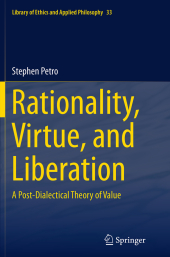 Neuerscheinungen 2016Stand: 2020-02-01 |
Schnellsuche
ISBN/Stichwort/Autor
|
Herderstraße 10
10625 Berlin
Tel.: 030 315 714 16
Fax 030 315 714 14
info@buchspektrum.de |

Stephen Petro
Rationality, Virtue, and Liberation
A Post-Dialectical Theory of Value
Softcover reprint of the original 1st ed. 2014. 2016. xiii, 327 S. 6 SW-Abb. 235 mm
Verlag/Jahr: SPRINGER, BERLIN; SPRINGER INTERNATIONAL PUBLISHING 2016
ISBN: 3-319-34654-7 (3319346547)
Neue ISBN: 978-3-319-34654-0 (9783319346540)
Preis und Lieferzeit: Bitte klicken
In what amounts to a radical revision of the concept of rationality that challenges conventional analytic and continental views alike, this book explores the overlooked yet vital theoretical relationships between R. M. Hare, Alan Gewirth, and Jürgen Habermas.
This book explores the overlooked but vital theoretical relationships between R. M. Hare, Alan Gewirth, and Jürgen Habermas. The author claims their accounts of value, while failing to address classic virtue-theoretical critiques, bear the seeds of a resolution to the ultimate question "What is most valuable?" These dialectical approaches, as claimed, justify a reinterpretation of value and value judgment according to the Carnapian conception of an empirical-linguistic framework or grammar. Through a further synthesis with the work of Philippa Foot and Thomas Magnell, the author shows that "value" would be literally meaningless without four fundamental phenomena which constitute such a framework: Logical Judgment, Conceptual Synthesis, Conceptual Abstraction, and Freedom. As part of the ´grammar of goodness,´ the excellence of these phenomena, in a highly concrete way, constitute the essence of the greatest good, as this book explains.
Introduction.- Chapter I: Rethinking Rationality; 1.1 The Reconciliation of Ethical Rationalism, Ethical Naturalism, Virtue Ethics, and the Biological and Social Sciences; 1.2: The Failure of Axiological Anti-Foundationalism; 1.3: The Concept of Rationality: Toward a Universal Model.- Chapter II: Rationality and Dialectical Necessity; 2.1: Prescription, Preference, and Dialectical Contingence; 2.2: Developing a Method of Justification; 2.3: A Sound Positive Account, Part I: An Analysis of Gewirth´s Ethical Rationalism; 2.4: A Sound Positive Account, Part II: An Analysis of Habermas´s Discourse Ethics.- Chapter III: The Dialectical Structure of Value Judgments; 3.1: The Dialectical Structure of "Ought" and "Must"; 3.2: The Dialectical Structure of Rights and Duties.- Chapter IV: Rationality, Virtue, and the Search for Intrinsic Goodness; 4.1: Magnell´s Challenge; 4.2: Problems in Searle´s Epistemology of Function; 4.3: The Life Framework: The Significance of Foot´s Virtue Theory Chapter V: Beyond Dialectical Necessity: Assertoric Necessity and the Grammar of Goodness; 5.1: Reflexive Intrinsicality & The Teleologically Comparative Tendential Necessity of Functions; 5.2: The Summum.- Bonum Conclusion.


